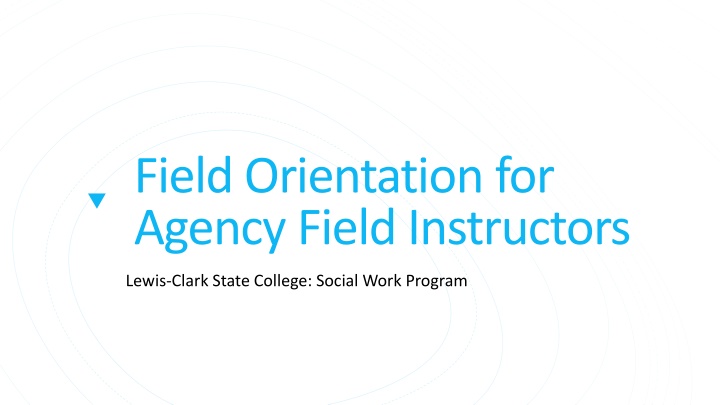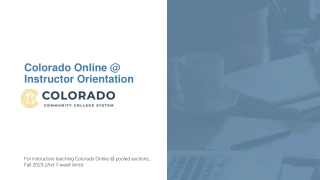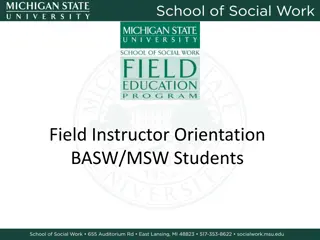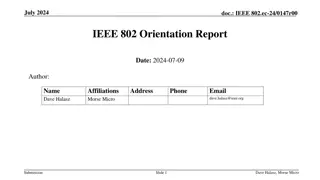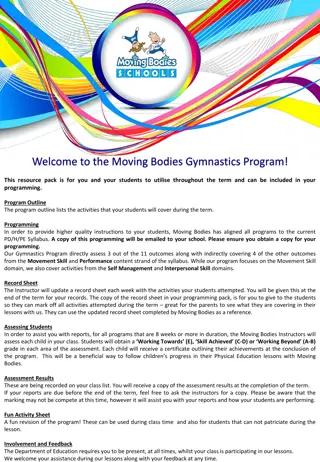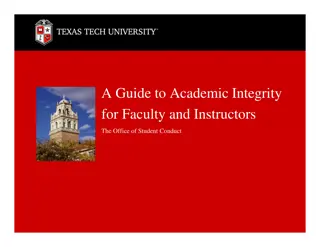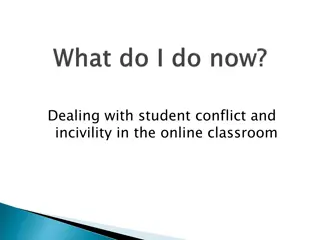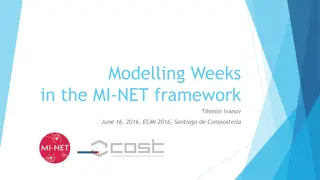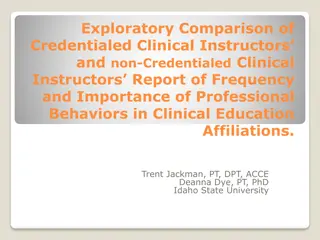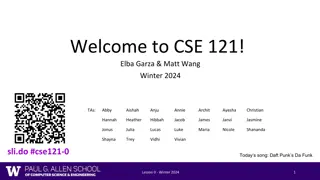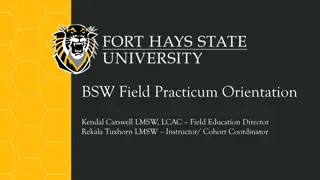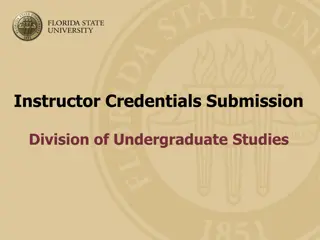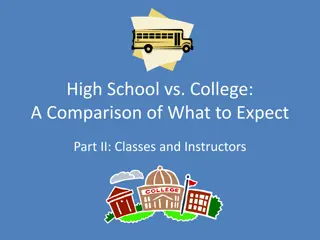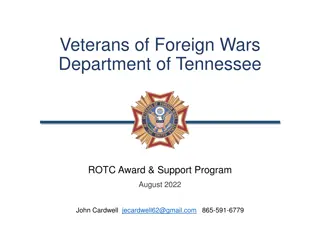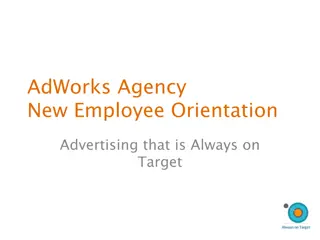Field Orientation for Agency Field Instructors
Qualifications and responsibilities for agency field instructors and task instructors at Lewis-Clark State College's Social Work Program. Learn about qualifications, weekly supervision, and how to get started in field education. Responsibilities include aiding in student learning agreements, providing regular supervision, and addressing performance issues promptly.
Download Presentation

Please find below an Image/Link to download the presentation.
The content on the website is provided AS IS for your information and personal use only. It may not be sold, licensed, or shared on other websites without obtaining consent from the author.If you encounter any issues during the download, it is possible that the publisher has removed the file from their server.
You are allowed to download the files provided on this website for personal or commercial use, subject to the condition that they are used lawfully. All files are the property of their respective owners.
The content on the website is provided AS IS for your information and personal use only. It may not be sold, licensed, or shared on other websites without obtaining consent from the author.
E N D
Presentation Transcript
Field Orientation for Agency Field Instructors Lewis-Clark State College: Social Work Program
Qualifications for an Agency Field Instructor Weekly supervision Orientation to Agency Learning Agreement How to get started in field education
LC State Agency Field Instructors need to meet the following qualifications: Graduation from a CSWE accredited School of Social Work with a BSW or MSW; Two or more years of professional social work practice; Employment at your current agency for at least 6 months; Qualifications
Task Instructor Qualifications At times, an agency does not have a social worker on staff. In these cases someone else at the agency may act as the intern s supervisor. Task Instructor Qualifications: Has a bachelor degree in a related field; Has worked for at least two years at the agency; Has the knowledge of social work ethics, values and skills needed for your intern.
Submit Resume to Field Director socialwork@lcsc.edu
To aid in the development of a clear and realistic learning agreement with the student that will outline the activities for the student in the agency; To outline agency expectations of the student s work, including what they can and cannot do, safety, how to report daily activities, how to report case contacts and so forth; To provide an hour per week of regular supervision with the student and allow adequate time for discussion of student s concerns and progress; To work with the faculty liaison and student to ensure the objectives of the field practicum are being met; Agency Field Instructor Responsibilities
To discuss problems relating to performance with intern as they arise and to contact the faculty field liaison if those problems are not resolved; To immediately notify the faculty field liaison when more serious issues and/or concerns arise. For example: if student disregards agency regulations; violates the NASW Code of Ethics; fails to appear for work without prior notice; is consistently late; neglects the learning contract; or in other ways is disruptive to agency functioning; To work with the faculty liaison and student to ensure the objectives of the field practicum are being met;
To notify, as soon as possible, the faculty liaison if significant changes occur in the nature of the field placement which will affect the opportunities and quality of learning for students; To complete an evaluation of the student s field practicum performance at the end of each semester and recommend a grade of pass or fail following the completion of the evaluation. To meet at the end of each semester to discuss this evaluation. This meeting will be with the AFI, the Field Liaison, and the student.
1 Hour Weekly Supervision Administrative Educational Supportive
The role of the Field Liaison is: Who supports the Agency Field/Task Instructor (AFI)? To maintain a connection between student and AFI; To act as a mentor to the student in problem solving; To meet with student of AFI for evaluations.
Your Interns Responsibilities To complete 200 hours of supervised experience in a social service agency each semester of field placement for a total of 400 hours during the year; To work with the AFI to develop a learning contract which outlines the activities of the field placement; To maintain accurate time sheets submitted the month following the hours completed; To renegotiate their contract with AFI in the event of difficulties regarding task assignments, prior to contacting the faculty field liaison;
Your Interns Responsibilities Continued To establish a schedule, be punctual, and keep all appointments. Students are expected to conform to agency working hours and holiday schedules. Scheduling should be based on client needs; To keep confidential all information about clients served by the agency; To understand and practice the National Association of Social Workers (NASW) Code of Ethics;
The LC State Social Work Program also provides the AFIs and interns with a Field Manual which outlines in greater detail the requirements of Field. Field Manual
AFI/Task Instructor Agency Student Mid-Point Assessment Hours Documents Intern Edu. Agreement Exit Learning Agreement Assessment
make ethical decisions by applying the standards of the NASW Code of Ethics, relevant laws and regulations, models for ethical decision-making, ethical conduct of research, and additional codes of ethics as appropriate to context (1.1); use reflections and self-regulation to manage personal values and maintain professionalism in practice situations (1.2); demonstrate professional demeanor in behavior; appearance; and oral, written, and electronic communication (1.3); use technology ethically and appropriately to facilitate practice outcomes (1.4); and use supervision and consultation to guide professional judgment and behavior (1.5). Demonstrate Ethical and Professional Behavior
apply and communicate understanding of the importance of diversity and difference in shaping life experiences in practice at the micro, mezzo, and macro levels (2.1); Apply present themselves as learners and engage clients and constituencies as expert of their own experiences (2.2); and Engage Diversity and Difference in Practice Present apply self-awareness and self- regulation to manage the influence of personal biases and values in working with diverse clients and constituencies (2.3). Apply
Advance Human Rights and Social, Economic, and Environmental Justice apply their understanding of social, economic, and environmental justice to advocate for human rights at the individual and system levels (3.1); and engage in practices that advance social, economic, and environmental justice (3.2).
use practice experience and theory to inform scientific inquiry and research (4.1); apply critical thinking to engage in analysis of quantitative and qualitative research methods and research findings (4.2); and use and translate research evidence to inform and improve practice, policy, and service delivery (4.3). Engage in Practice-Informed Research and Research-Informed Practice
Engage in Policy Practice Identify Assess Apply identify social policy at the local, state, and federal level that impacts well-being, service delivery, and access to social services (5.1); assess how social welfare and economic policies impact the delivery of and access to social services (5.2); and apply critical thinking to analyze, formulate, and advocate for policies that advance human rights and social, economic, and environmental justice (5.3).
Interns skills in engagement, assessment, intervention and evaluation of practice (competencies 6, 7, 8, and 9) should, ideally, happen at all five levels of social work: Work with individuals, Work with families, Work with groups, Work with organizations, and Work with communities. Levels of Connection
In-Person Contact In-person client contact. This should include work with individuals, families, and groups. Interns should also work directly with members of organizations and communities. Working with individuals this may include providing direct services, providing case management services, or crisis management services. Working with families this may include attending family meetings, discussions with clients about their families, or attending functions developed for families. Work with groups these may be client groups or staff groups such as providing trainings to staff. Work with organizations - such as meeting with organizations outside of your own agency. Work with communities this may include attending community wide meetings.
Engage with Individuals, Families, Groups, Organizations, and Communities. apply knowledge of human behavior and the social environment, person-in- environment, and other multidisciplinary theoretical frameworks to engage with clients and constituencies (6.1); and use empathy, reflection, and interpersonal skills to effectively engage diverse clients and constituencies (6.2).
Assess Individuals, Families, Groups, Organizations, and Communities Collect and organize Apply Develop Select collect and organize data, and apply critical thinking to interpret information from clients and constituencies 7.1); apply knowledge of human behavior and the social environment, person- in- environment, and other multidisciplinary theoretical frameworks in the analysis of assessment data from clients and constituencies (7.2); develop mutually agreed-on intervention goals and objectives based on the critical assessment of strengths, needs, and challenges within clients and constituencies (7.3); and select appropriate intervention strategies based on the assessment, research knowledge, and values and preferences of clients and constituencies (7.4)
Intervene with Individuals, Families, Groups, Organizations, and Communities facilitate effective transitions and endings that advance mutually agreed-on goals (8.4). negotiate, mediate, and advocate with and on behalf of diverse clients and constituencies (8.3); and use inter-professional collaboration as appropriate to achieve beneficial practice outcomes (8.2); apply knowledge of human behavior and the social environment, person- in- environment, and other multidisciplinary theoretical frameworks in interventions with clients and constituencies (8.1);
Evaluate Practice with Individuals, Families, Groups, Organizations, and Communities. select and use appropriate methods for evaluation of outcomes; Select and use apply knowledge of human behavior and the social environment, person-in environment, and other multidisciplinary theoretical frameworks in the evaluation of outcomes; Apply critically analyze, monitor, and evaluate intervention and program processes and outcomes; and Analyze, monitor, and evaluate apply evaluation findings to improve practice effectiveness at the micro, mezzo, and macro levels. Apply
The Learning Agreement You and your student will be provided with a sample Learning Agreement at the beginning of the academic year that will help you and your intern to develop learning tasks.
Building and office security; Agency protocols regarding emergency procedures; Safety plan when working with agitated clients, including the use of signal or code word to initiate help, de-escalation techniques, use of police or security, and evacuation; Policies regarding provision of services to clients who carry or have guns and weapons, if appropriate; Policies regarding provision of services to clients who are under the influence of alcohol or drugs; and Safety in transporting clients via agency vehicles. CSWE Safety Expectations
Physical restraint of clients even in agencies where this is a practice for trained personnel; Activities prohibited by the Social Work Program Providing client care at the agency at times when there are no other staff present; Distribution or handling of medication; Transportation of a client with a recent history of violent behavior; Any activities beyond the scope of BSW social work practice.
STUDENT EVALUATIONS AFIs evaluate students on the 9 core competencies as demonstrated in the agency at Midpoint (December) and Exit AFI & FIELD AGENCY EVALUATION Evaluations Students anonymously evaluate their agency field experience through Implicit Curriculum Survey in April Students evaluate Field Agency s ability to provide learning opportunities across all 9 core competencies within Field Agency Evaluation at the end of their internship in May
The AFI will provide the intern with an orientation to their agency. The intern may attend planned personnel trainings or may be informally oriented to the agency during supervision with you. Order of Getting Started Intern shadows AFI in their job responsibilities, AFI shadows intern at activities within learning contract, and then intern is launched to work with clients on their own.
If you have questions, please contact: The Field Liaison connected with your intern Or the Program Director (socialwork@lcsc.edu) Questions?
